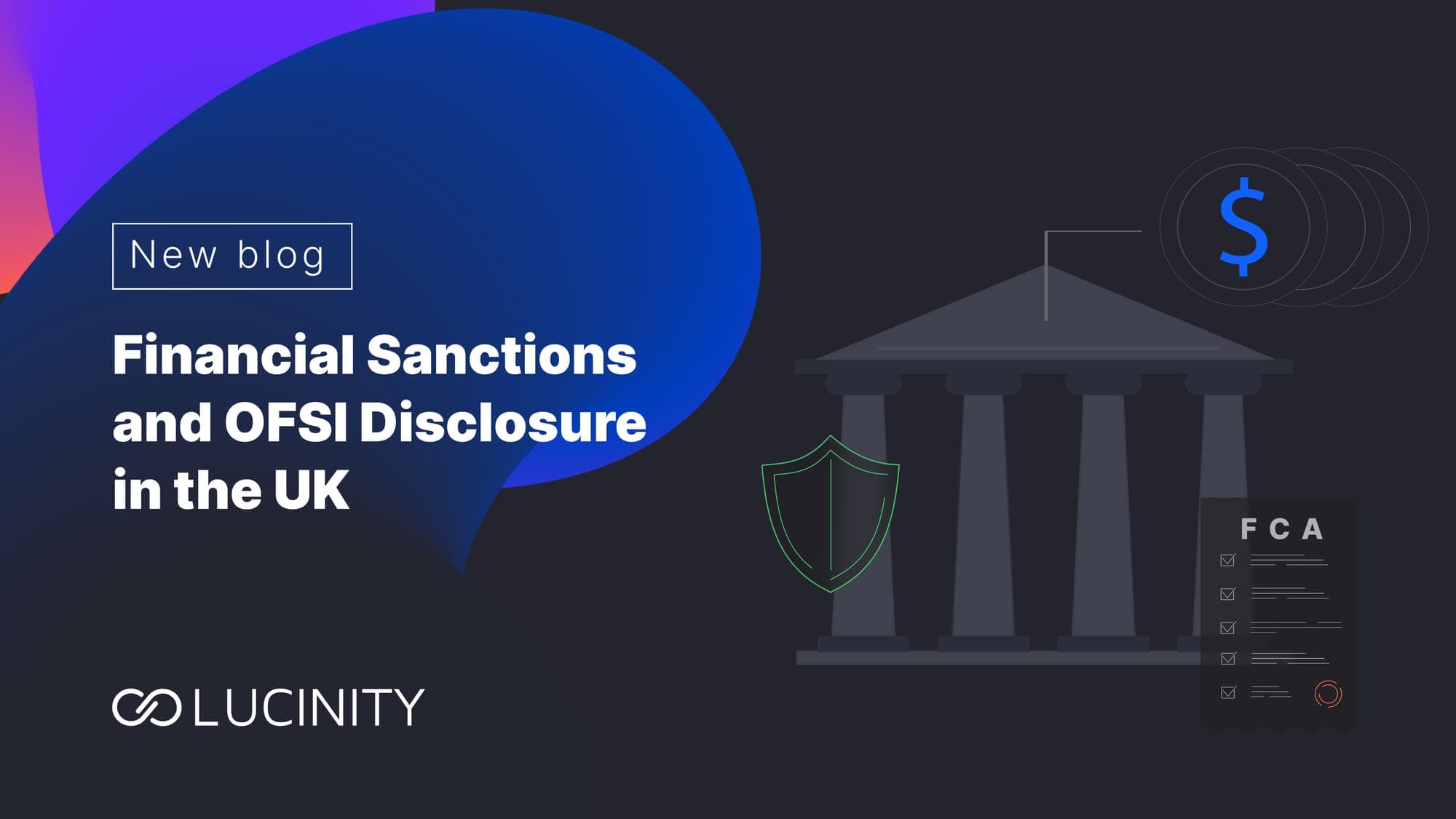7 AML Regulatory Fines and Their Impact on Risk Management Frameworks
Explore how these seven AML regulatory fines in history influenced the evolution of risk management frameworks and transformed financial regulations.
The stakes have never been higher for global companies when it comes to financial compliance. Regulatory bodies are tightening enforcement, leading to record fines and major shifts in risk management. A worrying statistic highlights the expensive consequences of non-compliance. In just the first half of 2023 alone, regulators imposed 97 fines amounting to over $189 million.
Today, we will take a look at seven landmark cases of regulatory fines to gain a deeper insight into regulatory fines, their cause, and their impact on compliance and risk management frameworks. We'll also cover how businesses can navigate the tough regulatory terrain and strengthen their risk management in the face of stricter regulations.
Binance's $4.3 Billion Fine for Violations Related to AML and Sanctions Laws
Binance, a major cryptocurrency exchange, was fined $4.3 billion by U.S. authorities, including the Department of Justice, for anti-money laundering (AML) and sanctions law violations. This was because Binance committed multiple violations knowingly; which included violating the Bank Secrecy Act (BSA), not reporting suspicious activities, doing business with sanctioned countries and criminals, and failing to register with the authorities as a money services business (MSB) and as a digital asset derivatives exchange operator.
This settlement, one of the largest in corporate history, comprised $1.8 billion in fines and $2.5 billion in forfeitures. Binance also agreed to appoint a compliance monitor for three years. This is the most recent case in this list, with Binance pleading guilty in November 2023. It emphasizes the urgent need for stringent AML measures in the cryptocurrency industry.
Impact
The fine served as a deterrent in the financial and cryptocurrency sectors and brought attention to the severity of non-compliance with financial regulations. Additionally, this enforcement action set a precedent for U.S. crypto regulation, highlighting the necessity for crypto firms to have strong compliance systems to meet regulatory standards and avoid similar fines.
HSBC's $1.9 Billion Fine for Violating the Bank Secrecy Act, International Emergency Economic Powers Act, and Trading with the Enemy Act
HSBC, a major global banking and financial services organization, faced a substantial fine in December 2012 following a deferred prosecution agreement with the U.S. Department of Justice. In addition to the forfeiting of $1.256 billion, there were multiple other fines imposed, taking the total to $1.9 billion in fines.
The fines were imposed due to HSBC's failure to comply with the Bank Secrecy Act, the International Emergency Economic Powers Act, and the Trading with the Enemy Act. The bank's shortcomings included inadequate AML programs and insufficient due diligence on foreign account holders, alongside dealings in U.S.-sanctioned countries such as Cuba, Iran, Libya, Sudan, and Burma.
Impact
In response to the fine, HSBC underwent significant transformations to enhance its AML and compliance frameworks globally. This included major management changes, the clawback of bonuses from senior AML and compliance officers, and a new system for deferred executive bonuses. This regulatory fine example is a reminder of the importance of robust compliance and risk management practices, highlighted by the severe financial and operational consequences of non-compliance.
Goldman Sachs' $3.9 Billion Fine in the 1MDB Scandal
Goldman Sachs Group Inc. settled for a huge sum of $3.9 billion in July 2020 over the 1MDB scandal, a Malaysian state fund involved in corruption and money laundering. The bank helped raise $6.5 billion for 1MDB in 2012 and 2013, with a significant portion allegedly misappropriated.
Goldman Sachs' Malaysian subsidiary pleaded guilty to violating the Foreign Corrupt Practices Act (FCPA), and the parent company entered a three-year deferred prosecution agreement. The settlement included a $1.26 billion payment to the U.S. Department of Justice, marking the largest criminal monetary penalty in a U.S. corporate foreign bribery resolution.
Impact
The 1MDB scandal prompted Goldman Sachs to make significant reforms, setting an example for the finance industry. They revamped governance and management oversight for better compliance, especially for major transactions. Moreover, they improved their anti-bribery program by strengthening internal controls, conducting risk assessments, updating intermediary policies, and enhancing compliance testing and training. These actions emphasize the need for financial institutions to have effective compliance frameworks and risk monitoring systems to prevent and address financial crimes.
Bank of Queensland - $50 Million Fine for AML Compliance Failures
The Bank of Queensland (BoQ) was subjected to a $50 million penalty in May 2023 due to its failure to adequately adhere to anti-money laundering (AML) regulations and to meet prudential standards. This enforcement action was a result of the bank's prolonged non-compliance, identified through a series of regulatory reviews and audits that underscored significant shortcomings in its risk management and AML controls.
Impact
The severe action against BoQ raised another warning about the necessity of strong anti-money laundering (AML) procedures in the banking sector. The case has shed light on the financial losses and reputational harm that can stem from failing to meet regulatory standards - potentially leading to a trust deficit with clients and stakeholders that can impede future business prospects.
In reaction to the regulatory actions, BoQ has agreed to implement a thorough remediation plan to fix the problems found. This plan involves improving its risk management framework and AML safeguards to avoid future breaches. The bank's initiative to overhaul its compliance framework highlights the importance for financial institutions to consistently review and enhance their AML and risk management systems to meet regulatory requirements and protect against financial crimes.
Deutsche Bank - $186 Million Fine for AML Shortcomings
The Federal Reserve imposed a $186 million fine on Deutsche Bank and its U.S. affiliates in July 2023 for failing to make sufficient progress in rectifying money laundering control deficiencies and other shortcomings previously identified by the U.S. central bank. This fine marks a continuation of the regulatory challenges Deutsche Bank has faced over the years, highlighting the need for financial institutions to address compliance issues proactively to avoid further penalties.
The Federal Reserve's enforcement actions stemmed from violations of consent orders issued in 2015 and 2017, which related to Deutsche Bank's deficient controls in its dealings with the Estonian branch of Danske Bank. The Fed's decision to issue this fine reflects the administration's stance on cracking down on repeat corporate offenders and the flow of illicit funds through the U.S. financial system.
Impact
This recent action taken against Deutsche Bank emphasizes the vital need for banks to have effective compliance frameworks and to enhance their risk and data management processes persistently. Deutsche Bank's pledge to remedy the deficiencies identified by the Federal Reserve could signal the bank's acknowledgment of the significance of compliance with regulatory standards and emphasize the serious consequences of neglect.
The Federal Reserve's actions in this case are a caution regarding the continuous examination financial institutions undergo concerning their anti-money laundering practices and the necessity for effective mechanisms to identify and stop illegal financial transactions. For Deutsche Bank, this penalty adds to a history of regulatory challenges, stressing the continuous need for compliance work and allocating sufficient resources to bolster its AML and compliance systems.
William Hill - £19.2 Million Fine for AML and Social Responsibility Failures
William Hill was fined a record £19.2 million by the UK Gambling Commission in March 2023 for a series of social responsibility and anti-money laundering (AML) failures. This fine, the largest ever imposed by the commission, reflects serious lapses in the company's practices, including inadequate customer checks and allowing significant gambling losses without proper AML examination. The breaches were so severe that license suspension was considered, yet improvements made by William Hill led to the imposition of a financial penalty instead.
Impact
In response to the commission's findings, William Hill has committed to substantial improvements in their compliance processes. This includes the implementation of more robust customer protection measures and enhancements to their AML protocols to prevent future failings. Such steps are essential for safeguarding against financial crime, protectin reputation, and ensuring the welfare of customers. If successful, they can set a compliance benchmark for the gambling industry for proper implementation of rigorous AML and social responsibility measures.
Natwest Bank- £264 million fine for AML failures
The NatWest case involves a £264 million fine charged in December 2021 for failing to monitor money laundering activities with Fowler Oldfield, underscoring the importance of rigorous AML compliance within financial institutions. This landmark event marks the FCA's first criminal charge for AML violations against a major bank. It also reveals the severe consequences of non-compliance, both financially and in terms of reputational damage, which is often irreversible.
Impact
The hefty fine on Natwest Bank for inadequate monitoring of money laundering activities is a reminder of the gravity of executing and maintaining strong AML controls within the banking sector. It signifies the UK Financial Conduct Authority's (FCA) aggressive stance on AML breaches, marking the first instance of the FCA imposing criminal charges for AML non-compliance against a leading financial entity. Natwest Bank has taken swift correcitve measures in response, aiming to minimize the immediate financial repercussions and also long lasting reputational damage that such fines typically cause.
The repercussions of this event extend beyond Natwest, serving as a potent reminder to all financial institutions about the criticality of robust AML systems. The fine denotes a clear message: violations of regulatory standards will meet with severe penalties, encouraging banks to re-evaluate and fortify their AML tactics.
Summing Up: Lessons from the Landscape of Regulatory Compliance
The cases explored in this blog are not just isolated incidents but pivotal instances that shape the trajectory of financial compliance and corporate governance. They reveal the importance of adhering to regulatory standards and the severe consequences of oversight. Here are some key takeaways:
Value of AML Compliance: Anti-money laundering (AML) compliance has surfaced as a key area requiring the utmost effort and resources from businesses, notably in the banking and cryptocurrency sectors, to meet regulatory standards and avoid hefty penalties.
Requirement for Strong Risk Management Frameworks: These cases emphasize the need for businesses to structure and uphold solid risk management and governance frameworks to avoid regulatory penalties.
Regulators are Becoming More Stringent: The escalating quantity and magnitude of fines indicate regulators' growing determination to suppress financial crimes and enforce governance more strictly, suggesting a more rigid regulatory atmosphere.
To tackle and overcome these challenges, organizations like Lucinity offer adaptable, technology-based solutions to help overcome complexities associated with regulatory compliance and risk management.
How Lucinity Can Assist You With Regulatory Compliance and Risk Management
Lucinity emerges with intelligent, adaptable solutions to address various industry challenges within regulatory compliance and risk management.
Our solutions provide advanced risk assessments by analyzing patterns within customer transactions and compiling a holistic view of customer profiles. Our compliance solutions are designed to monitor AML, fraud, and sanctions cases across various industries and integrate smoothly with your existing technology. Lucinity’s solutions also streamline reporting, ensuring accuracy and transparency.
Lucinity's AI-powered solutions offer a proactive approach to navigating these challenges, providing the tools and insights necessary for businesses to remain compliant and thrive in an increasingly complex regulatory environment. Learn more about Lucinity to explore how we can help you manage your regulatory risk.


